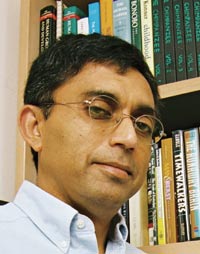2005 Karl Meyer Award Winner

 Ajit Varki Ajit Varki
Distinguished Professor of Medicine and Cellular & Molecular Medicine
Co-Director, Glycobiology Research and Training Center
Co-Director, UCSD/Salk Center for Academic Research and Training in Anthropogeny (CARTA)
Biography
Ajit Varki received basic training in physiology, medicine, biology, and biochemistry at the Christian Medical College, Vellore, The University of Nebraska, and Washington University in St. Louis. He also has formal training and certification in internal medicine, hematology, and oncology. He is currently distinguished professor of medicine and cellular and molecular medicine, and co-director of the Glycobiology Research and Training Center at UCSD. Dr. Varki is executive editor of the textbook Essentials of Glycobiology. He is also a co-director for the UCSD Center for Academic Research and Training in Anthropogeny and is an affiliate faculty member of the Living Links Center of Emory University. Dr. Varki is an elected member of the American Academy of Arts and Sciences, the Institute of Medicine, the American Society for Clinical Investigation, and the Association of American Physicians.
Dr. Varki is recipient of a MERIT award from the NIH, an American Cancer Society Faculty Research Award, the Karl Meyer Award of the Society for Glycobiology and the International Glycoconjugate Organization (IGO) Award (2007). He is a member of the Faculty of 1000 and serves on the National Chimpanzee Observatory Working Group; the scientific advisory board of the Huntsman Cancer Institute (University of Utah), and the editorial board of Glycobiology. He is a specialist advisor to the Human Gene Nomenclature Committee. Significant past appointments include: Associate Dean for Physician-Scientist Training at UCSD (2003-10); co-head, Division of Hematology/Oncology (1987-89): president of the Society for Glycobiology (1996); editor-in-chief of the Journal of Clinical Investigation (1992-97); consulting editor for the Journal of Clinical Investigation (1998-2006), and PLoS Medicine (2004-2008); interim directorship of the UCSD Cancer Center (1996-97); president of the American Society for Clinical Investigation (1998-99); scientific advisor to the Complex Carbohydrate Research Center (University of Georgia); the Yerkes Primate Center (Emory University); member of the National Advisory Committee of PubMed Central (NLM/NIH); and coordinator for the multidisciplinary UCSD Project for Explaining the Origins of Humans (1996-2007).
Research Interests
Our research interests are currently focused on a family of sugar molecules called the Sialic Acids, and their roles in biology, evolution and disease. The surfaces of all cells in all organisms are decorated with a dense and complex array of sugar chains. These "glycans" are known to mediate or modulate many biological processes including sub-cellular and cellular trafficking, intercellular adhesion, signaling, and microbial attachment. Much data also indicates their involvement in embryonic development, normal tissue organization, tumor metastasis, and in the interactions of cells with extra-cellular molecules. In recent years, improved technologies have permitted exploration of this new frontier of "Molecular Glycobiology." The Varki lab (directed by Ajit and Nissi Varki) uses these new approaches, along with the traditional tools of molecular biology, biochemistry, genetics and genomics to investigate selected areas of Glycobiology. The present focus is on the sialic acids, which are found at the outermost position on the glycan chains of all vertebrate cell surfaces and glycoproteins. Currently active projects are relevant to the roles of sialic acids in Viral and Bacterial Infectivity, the Regulation of the Immune Response, the Initiation and Progression of Tumors and Unique Aspects of Human Evolution. We are particularly intrigued to find multiple differences in sialic acid biology between humans and our closest evolutionary cousins, the great apes. These differences are a signature of the multiple cellular and molecular events that occurred during the last few million years of human evolution, and are relevant to understanding several aspects of the current human condition, both in health and disease.
|


 Ajit Varki
Ajit Varki